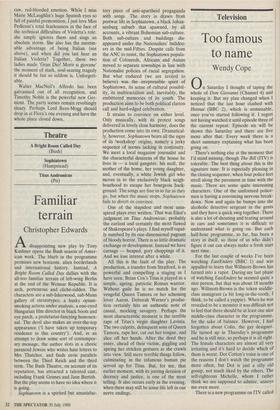Theatre
A Bright Room Called Day (Bush)
Sophiatown (Hampstead) Titus Andronicus (Pit)
Familiar terrain
Christopher Edwards
Adisappointing new play by Tony Kushner opens the Bush season of Amer- ican work. The blurb in the programme promises new horizons, alien borderlands and international history. Instead, A Bright Room Called Day dallies with the all-too familiar terrain of left-wing Berlin at the end of the Weimar Republic. It is arch, portentous and cliche-ridden. The characters are a sub-Isherwood, sub-Mann gallery of stereotypes; a husky opium- smoking actress under analysis, a one-eyed Hungarian film director in black boots and eye patch, a proletariat-fancying homosex- ual. The devil also makes an over-the-top appearance CI have taken up temporary residence in this country'). And, in an attempt to draw some sort of contempor- ary message, the author slots in a choric paranoid Jewess who writes hate letters to Mrs Thatcher, and finds eerie parallels between the Third Reich and the third term. The Bush Theatre, on account of its reputation, has attracted a talented cast, including Frank Grimes and Jane Bertish. But the play seems to have no idea where it is going.
Sophiatown is a spirited but unsatisfac- tory piece of anti-apartheid progaganda with songs. The story is drawn from postwar life in Sophiatown, a black Johan- nesburg suburb that spawned, by all accounts, a vibrant Bohemian sub-culture. Both sub-culture and buildings dis- appeared under the Nationalists' bulldoz- ers in the mid-Fifties. Despite calls from the ANC to resist, the Sophiatown popula- tion of Coloureds, Africans and Asians moved to separate townships in line with Nationalist policies of racial segregation. But what endured (we are invited to believe) was the irrepressible spirit of Sophiatown, its sense of cultural possibil- ity, its multiracialism and, inevitably, the embittered memories of its youth. The production aims to be both political clarion call and hard-edged celebration.
It strains to convince on either level. Only musically, with its protest songs delivered in lovely close harmony, does the production come into its own. Dramatical- ly, however, Sophiatown bears all the signs of its 'workshop' origins, namely a jerky sequence of scenes lacking in continuity. We meet a local magazine journalist and the characterful denizens of the house he lives in — a local gangster, his moll, the mother of the home, her young daughter, and, eventually, a white Jewish girl who moves in to the exclusively black neigh- bourhood to escape her bourgeois back- ground. The songs are fine in so far as they go, but when the music stops, Sophiatown fails to divert or convince.
One of the stupidest and most unin- spired plays ever written. That was Eliot's judgment on Titus Andronicus, probably the earliest and certainly the most flawed of Shakespeare's plays. I find myself rapid- ly numbed by its one-dimensional pageant of bloody horror. There is so little dramatic exchange or development. Instead we have carnage — heaped, gory choppings of it. And we lose interest after a while.
All this is the fault of the play. The production, a transfer from Stratford, is as powerful and compelling a staging as I have seen. Brian Cox's Titus is played as a simple, ageing, patriotic Roman warrior. Without guile he is no match for the vengeful Queen Tamora or her scheming lover Aaron. Deborah Warner's produc- tion certainly hits an authentic note of casual, mocking savagery. Perhaps the most characteristic moment is the terrible rape of Titus's virgin daughter Lavinia. The two culprits, delinquent sons of Queen Tamora, rape her, cut out her tongue, and slice off her hands. After the deed they enter, ahead of their victim, giggling and apeing her stricken gestures as she crawls into view. Still more terrible things follow, culminating in the infamous human pie served up for Titus. But, for me, that earlier moment, with its jeering derision of decency and justice, is one of the most telling. It also occurs early in the evening, when there may still be some life left in our nerve endings.














































 Previous page
Previous page